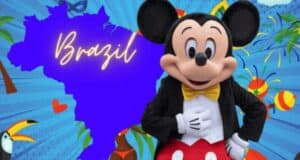
Disney is gearing up to say goodbye to Walt Disney’s Mickey Mouse, and for the first time, the company is talking about what the loss will mean for Disney and for fans, but says though the company is losing the rights to Mickey, it has not given up the fight for Mickey.
Also Read: Timeless Photos of Walt Disney Capture the Heart and Soul of the Genius Visionary
What Will Become of the Steamboat Willie Version of Mickey?
After years of thinking about the date being “somewhere off in the distant future,” the date of Mickey Mouse’s entrance into the public domain is at hand, but not everyone realizes the depth of such a loss.
On January 1, 2024, Walt Disney’s first version or iteration of Mickey Mouse–Steamboat Willie–will officially enter the public domain. What that might mean for the Steamboat Willie character is anyone’s guess.
Related: Disney’s Losing the Rights to Mickey Mouse, And That’s Not the Weirdest Part of the Story
With the worry of copyright infringement gone, artists, writers, creators, and others can seemingly do what they want with Steamboat Willie, and if the earliest form of Mickey Mouse falls prey to certain creators like Winnie the Pooh did when he made his way to the public domain, the results could be horrific–quite literally.
In 2022, the Winnie the Pooh character entered the public domain as he first appeared in 1926 in the novel by author AA Milne, titled The Many Adventures of Winnie the Pooh. Immediately following the removal of Disney’s rights to the Silly Old Bear, independent British writer, producer, and director Rhys Frake-Waterfield made a horror film starring Winnie the Pooh as a murderous villain in a horror flick titled Winnie the Pooh: Blood and Honey.
The End of Disney’s Rights, Not Disney’s Fight
Now, however, The Walt Disney Company has finally spoken publicly about losing the rights to Steamboat Willie, and according to a statement given to the Associated Press, some things about Steamboat Willie will not change, regardless of whether Disney owns the rights to him or not.
“Ever since Mickey Mouse’s first appearance in the 1928 short film Steamboat Willie, people have associated the character with Disney’s stories, experiences, and authentic products,” a Disney spokesperson said. “That will not change when the copyright in the Steamboat Willie film expires.”
According to Disney, beginning on January 1, 2024, creators will be able to use Mickey Mouse in their own projects, but there will be “major limits” to that use.
“More modern versions of Mickey will remain unaffected by the expiration of the Steamboat Willie copyright, and Mickey will continue to play a leading role as a global ambassador for the Walt Disney Company in our storytelling, theme park attractions, and merchandise,” Disney’s statement said.
According to the Associated Press, “not every feature or personality trait a character displays is necessarily copyrightable,” and it’s entirely possible that U.S. courts could be tasked with deciding what Disney owns and what it does not own with respect to characters like Mickey who have crossed over into the public domain.
Disney says the company will still be focused on protecting its rights.
“We will, of course, continue to protect our rights in the more modern versions of Mickey Mouse and other works that remain subject to copyright,” the company said.
Though Disney will no longer own the copyright to Steamboat Willie as of January 1, the entertainment giant does hold a trademark on Mickey as the brand identifier for Disney. U.S. law makes it illegal to use characters like Mickey Mouse and others to trick potential customers into thinking products and services originated from the initial creator of that character.
Case in point: no individual or entity intent on opening an entertainment company or a theme park resort will be permitted to use mouse ears–Mickey’s hallmark–as their logo.
Mickey’s Not Going Alone
Disney further said in its statement that the company “will work to safeguard against consumer confusion caused by unauthorized uses of Mickey and our other iconic characters.”
Mickey isn’t the only Disney character leaving for the public domain on January 1. He will be joined by the earliest iteration of Minnie Mouse, which also debuted in 1928, as well as Winnie the Pooh’s pal Tigger, who made his debut in the AA Milne novel titled The House at Pooh Corner in 1928.
This post is originally appeared on Disney Dining.

 DisneyTips.com Your Guide To A Great Disney Vacation
DisneyTips.com Your Guide To A Great Disney Vacation









